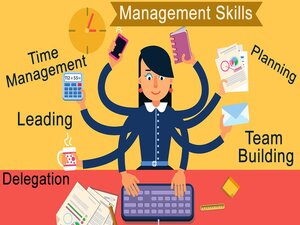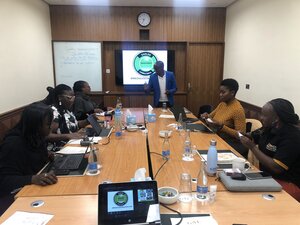Course Overview
Your new managers and leaders will benefit from the fundamental skills learned in the Management Skills for New Manager Training Course as you work to transform them from individual contributors to results-driven managers. Learning new things and getting hands-on management experience are two ways to improve your management talents. The ability to relate to coworkers and deal well with subordinates provides for the smooth flow of business operations inside the organization.
You will learn how to modify your leadership style and take on new challenges through guided role-play, exercises, and skill practice sessions. You go through the paces of inspiration, delegation, coaching, communication, performance management, and more through in-depth skill practice utilizing the Situational Leadership® II paradigm paired with interactive activities.
You will be able to play to your strengths, make necessary improvements, and get the best performance out of each team member.
Management Capability for Situational Leadership® II, a concept for developing people and a technique for leaders to assist their staff in becoming self-reliant achievers, is introduced in the New Manager Training Course. To be genuinely effective in their leadership, management must adjust to the abilities and dedication of the individuals they wish to influence. Managers have to give a lot of direction to some employees. With others, positive reinforcement and admiration provide the best outcomes. Others, however, perform at their peak when given the freedom to seize the initiative. Situational Leadership® II aids in managers’ increased adaptability and responsiveness.



Course Objectives
- Explain your managerial duties and role in detail.
- Manage the output of your direct reports well.
- Utilize the intrinsic motivation of your staff to achieve success.
- Choose the most effective communication channels for your company.
- Study and put situational leadership ideas to use II
- benefits of successful delegating and how to do it
- Discover your coaching assets
Management & Supervisory Training Highlights
Training Feedback
Happy Customers
Course Outline
Lesson 1: Your Managerial Role
- Requisite qualities and skills
The traits and skills necessary for efficient management
- Your managerial duties and responsibilities
- How to collaborate well across generations in the workplace
- Managing matrixed teams and remote workers
Lesson 2 – Curriculum
- Managing performance effectively has difficulties.
- Planning, facilitating and evaluating performance
- Setting objectives, giving constructive criticism, and having talks about alignment
Lesson 3: Course
- What truly constitutes good communication
- The exchange of information
- Obstacles that could lead to confusion and derailment
- The relative value of in-person communication
- Five components of effectively managing communication
- Choosing the best communication strategy for your needs
- Challenges and strategies for virtual communication
Lesson 4: The Art of Influencing Others with Situational Leadership® II
- Develop people, respect diversity, and promote more regular and sincere communication
- Develop your leadership style to increase employee dedication to their work and competency.
- Adapt your leadership style to the needs of the employee’s professional development and the current work.
Lesson 5: Performance Coaching
- How coaching advances, improves and accomplishes objectives
- Coaching requirements and their significance
- Practice guiding and correcting hard behaviors
- For managing a coaching discussion, refer to the AMA Guide.
- Distinctions between discipline and coaching
Lesson 6: Fostering a Climate of Motivation
- Motivation and your part in establishing a motivating environment
- The price of disengagement and low motivation
- The process of motivation’s key components
- Make up your method for creating a motivating environment.
Lesson 7: Delegation for Growth and Development
- Delegation types, advantages, and difficulties Recognize your level of comfort with the delegation
Who Should Attend
- Senior marketing directors or managers
- Relationship managers and
- Customer relationship managers
- Professionals in customer service, supervisors,
- Team leaders, and managers
- Sales experts, salespeople, and sales analysts
- Entrepreneurs and founders of startups
Trainers Available for:
- In-House Trainings
- Online Training
- 2 Hours Crush Program
- Half Day Program
- One Day Program
- Two Days Full Program
Training Techniques
- Power point Presentations
- Engaging conversations
- Case studies
- Exercises in solving problems
- Focus Group Conversations
- Games in Management
- Skits and modeling the part
Request a Quote

